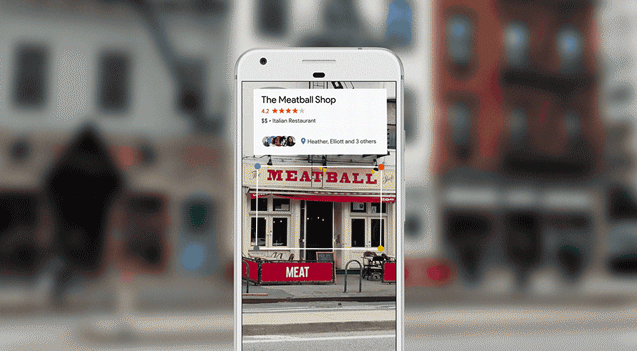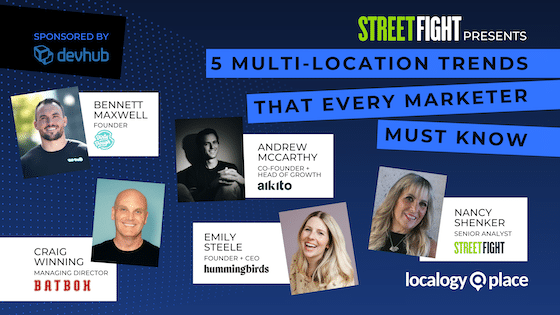The metaverse continues to be as ambiguous as it is opportune. But that’s not to say its future-gazing is a frivolous endeavor. There are legitimate discussions underway as a thought exercise for mapping out our long-run connected future. That future will likely involve a 3D “embodied” version of today’s web.
This was a topic batted around at Localogy’s recent Place conference, carrying the theme of real-world metaverse. Compared with its more online and immersive counterpart, this “real-world” metaverse track involves infusing depth and dimension to the physical world… a potentially more valuable outcome.
But regardless of which metaverse track we’re talking about, it will be adapted for marketing purposes. As Meta discussed on stage during the Place event, early adopter brands like Wendy’s are beginning to devise a metaverse marketing playbook as part of their media mix (more on that in a bit).
And like past emerging tech, this could start with brands, then trickle down to SMBs. We’ve seen this movie before on the desktop web, smartphone, and other flavors of local marketing such as social. Aggregate SMBs adoption is a trailing indicator. Will the same happen for metaverse marketing?
Historical Lessons
When synthesizing these concepts in the wake of Localogy Place – and viewing them through the lens of historical lessons – Localogy president Bill Dinan posed a question: Will the metaverse require SMB resellers? Like past emerging tech, will SMBs need their hands held by local agencies and sales reps?
The easy answer is yes, given historical patterns. But the need for that consultative touchpoint for SMBs could be amplified even further by the metaverse’s ambiguity. There’s little definition and ample confusion among media & tech proponents, not to mention everyday SMBs and tech-novice masses.
This could breathe new life into any media company or agency that differentiates itself by having direct sales touchpoints to SMBs. That advantage was once strong but has declined over time as previously-emergent tech (search, social, etc.) has gotten more mundane and conducive to “self-serve.”
Metaverse marketing could conversely hit the reset button on that key differentiator. In fact, We’ve always held that the greatest opportunity for local marketing players is when there are equal parts opportunity and confusion in the media mix. The metaverse could spin that concept into hyperdrive.
Identify and Interact
Stepping back, what do we mean by “metaverse marketing?” Again, these terms are shrouded in ambiguity so require some definition… which is somehow rarely done in breathless punditry about how the metaverse will change everything. It likely won’t change everything but rather elevate a few things.
One example of metaverse marketing is what, again, Wendy’s has done. This goes back to the first metaverse “track” presented above: utilizing online synchronous 3D worlds. This seems intimidating but could be simplified and conceptualized as an additional point of engagement with new audiences.
In other words, rather than getting carried away in advanced concepts like selling virtual goods, it’s more of an incremental presence play… just like your social media strategy. Be present in places like Roblox or Horizon Worlds so users can interact with your brand in fun and native ways (tactics outlined here).
As for the second metaverse “track,” it involves digital dimension in the physical world. This is where it gets even more “local.” One example is visual search, where users (especially camera-native gen-Z), hold up their phones up to identify and interact with physical objects – from statues to storefronts.
New Flavor of SEO?
If that visual search use case becomes ubiquitous (and that’s a big “if”) this could engender a new flavor of SEO where local businesses optimize their presence and listings to show up in such visual searches. This could be an offshoot of the SEO they currently perform to rank higher in 2D local search results.
And like local SEO today, it will be all about organizing and updating business info and metadata. The concept may be similar but the data itself will be more visual, given that the UX itself is. We’re talking Lidar-like spatial maps of storefronts so cameras can “localize” and identify them with Google Lens.
In that sense, think of the real-world metaverese as a sort of “Internet of places.” And just like Google created immense value indexing the web over 20+ years, it now wants to index the physical world to make it (visually) searchable. That’s where spatial maps come in, and it’s already gotten started.
Regardless of the technicalities, this brings us back to SMB resellers. Just as search agencies today hold SMBs’ hands with SEO, they’ll do the same as the tech and tools evolve. The lesson to agencies: future-proof yourself for when that day arrives. The good news is that you may have lots of time to do it.



